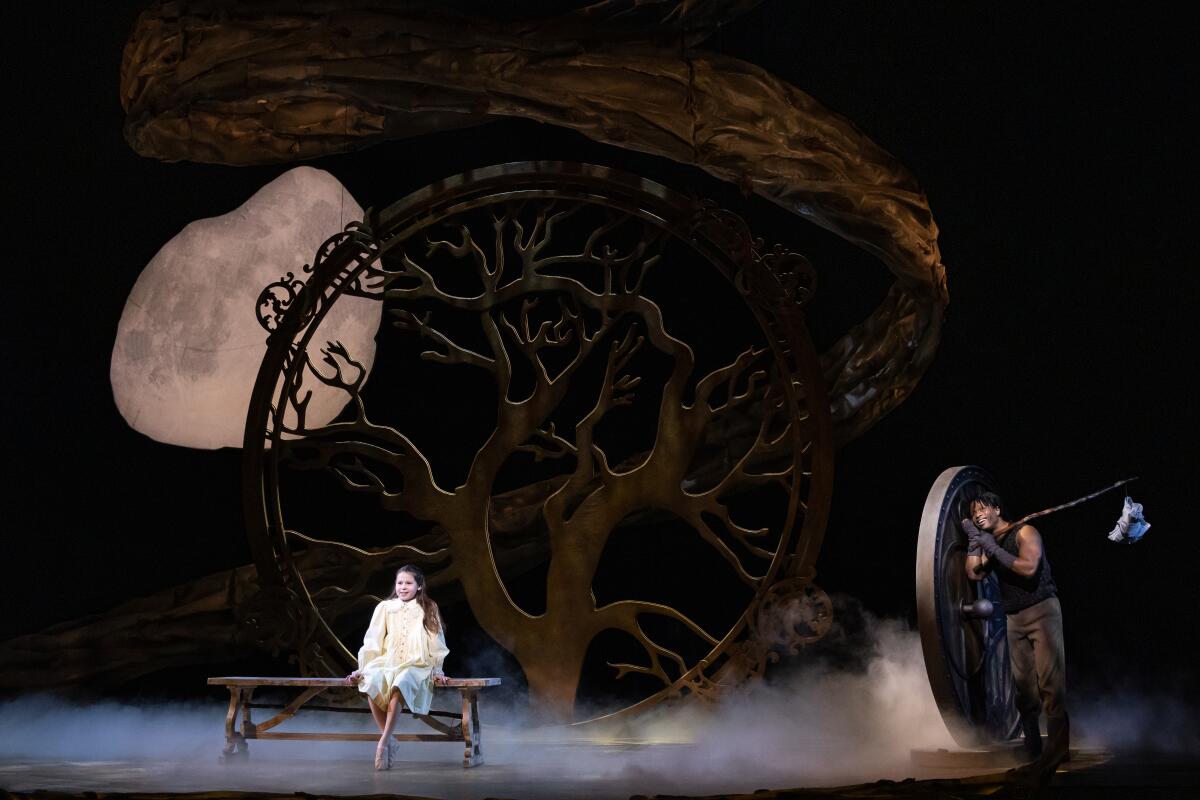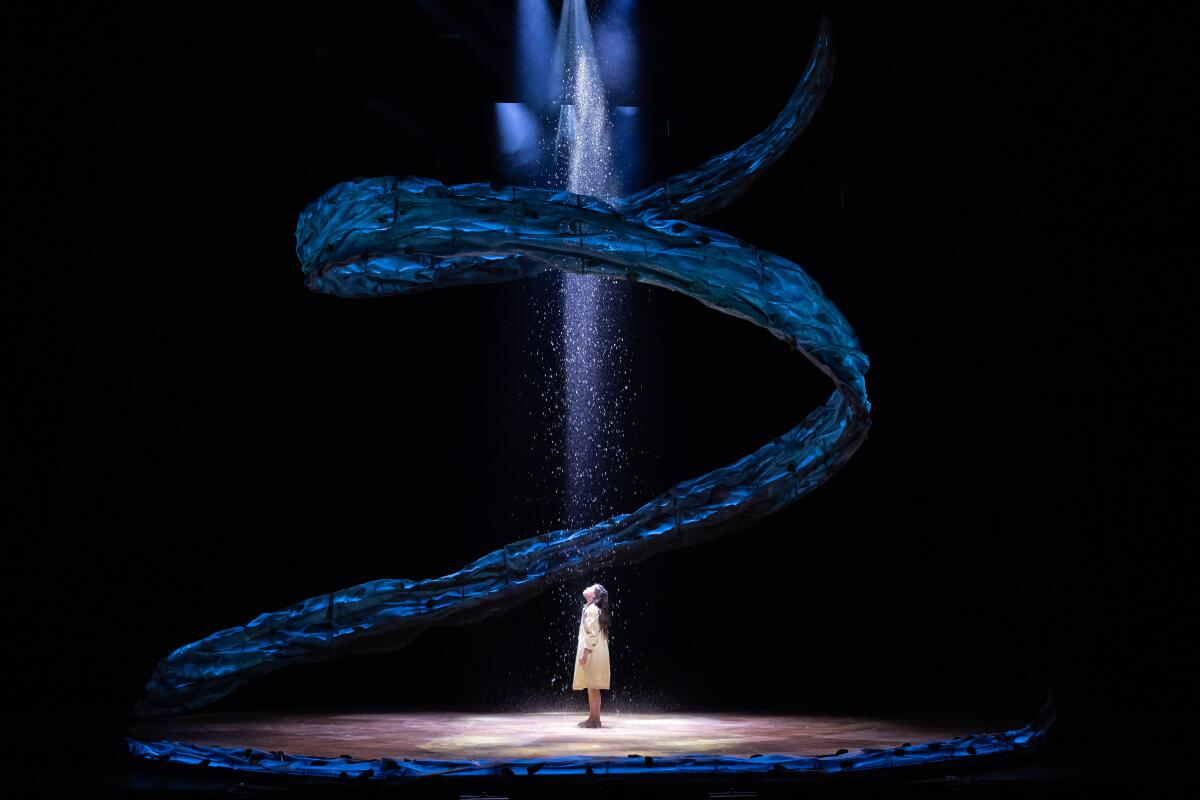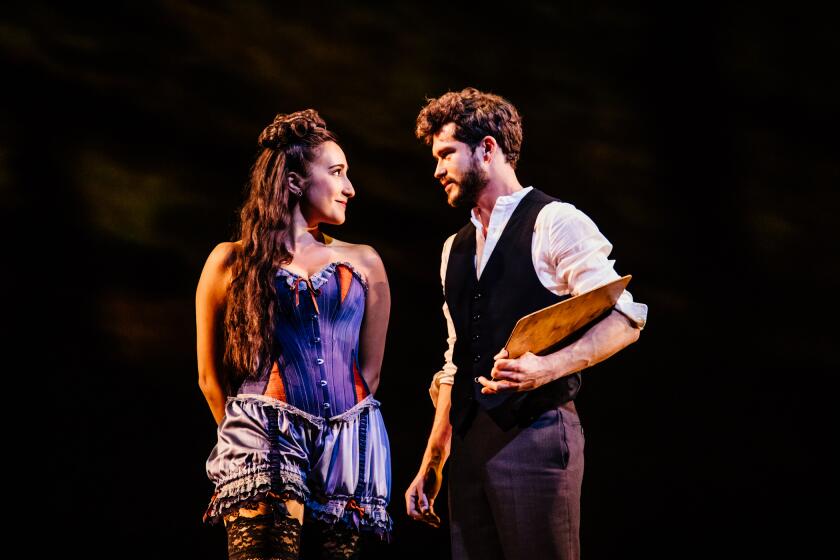Review: A reimagined ‘Secret Garden’ fails to flower anew at the Ahmanson Theatre

- Share via
“The Secret Garden” could be counted a success when it first emerged on Broadway in 1991. The show ran for more than 700 performances and won three Tony Awards, including one for playwright Marsha Norman’s book.
But a good many critics sniffed, and there was a lingering sense that a better musical was waiting to be unearthed from all the theatrical layers. Frank Rich ended his New York Times review with a comment on how the creative team adapted Frances Hodgson Burnett’s classic children‘s novel: “Is it too churlish to wish that they turned the pages a little faster?”
The new production of “The Secret Garden,” which opened Sunday at the Ahmanson Theatre, seems to have taken Rich’s note to heart. A new director, Warren Carlyle, has streamlined the show, shaving 20 minutes of running time through a combination of textual cuts and fleeter scenic design choices.
But the result isn’t so much a rebirth of “The Secret Garden” as a retooled touring version. The musical, which features a score by Lucy Simon with unrepressed operatic aspirations, is ready to hit the road. Jason Sherwood’s sets, devoid of any sense of place, appear to have been designed with only logistical efficiency in mind.
Other changes have been implemented to bring the show more in alignment with contemporary cultural sensibilities. The approach to casting is now more diverse, and the novel’s colonialist perspective, which the original Broadway production reified in its careless references to India, has been cleaned up.
But the core set of problems that held the show back hasn’t been addressed. A beloved children’s story is still incongruously masquerading on stage as an Andrew Lloyd Webber musical. At Sunday’s opening, I sat next to an adorable girl who was generous with her smiling applause, but I wouldn’t want to introduce my nieces to Burnett’s marvelous tale through a version that keeps upstaging its sprightly youths with tediously drawn adults that Norman (contra Burnett) melodramatizes.
This 1911 novel is both a product of its historical moment and, in its intuitive psychological understanding of human development, ahead of its time. The protagonist is a spoiled 10-year-old named Mary Lennox, born and raised in British India. Servants dance attendance on this obstreperous youngster, whose haughtiness is no doubt inflamed by her cold, aristocratic mother and distracted military captain father.
The sprawling estate in Yorkshire where Mary is sent after her parents die in a cholera outbreak is imprisoned in the past. Scores of locked-up rooms lend the house a sense of forbidding mystery, and the portraits of ancestors hanging on the walls place the girl under ghostly surveillance.
Life is grim for Mary until she discovers the existence of a secret walled garden that no one is permitted to enter. Archibald Craven, Mary’s uncle, had the entrance locked after his wife died, her beloved sanctuary being too painful a reminder of the grievous loss that has robbed him of all happiness.
It’s not long before rule-flouting Mary finds the key to this wintry sanctuary. With the help of Dickon, a local nature-loving boy who is the brother of her chamber maid, and Colin Craven, Archibald’s sickly son who has been secluded away in the house, the garden is resurrected — and with it the spiritual and moral lives of Mary and her even more disagreeably imperious cousin, Colin.
Pasadena Playhouse’s Sondheim Celebration kicks into gear with a revival of “Sunday in the Park With George,” directed by Sarna Lapine.
Norman doesn’t follow the exact genealogy of the characters in the novel. But her more significant (and, to my mind, wrongheaded) adjustment gives the adults, both living and dead, primacy over the children.
Lily Craven, Archibald’s deceased wife, haunts the house and garden almost like a secret author, guiding the plot toward its happy conclusion. The role is played by Sierra Boggess, whose exquisite warbling turns a long-dead character into a central figure. (She’s not the only ghost in a show that also brings back from the grave Mary’s parents and former servants.)
The musical doesn’t dispatch bereaved Archibald (Derrick Davis) as quickly as the book does. His somber presence darkens the halls of Misselthwaite Manor and threatens Mary’s freedom. When he eventually leaves for the continent, Dr. Neville Craven (Aaron Lazar), who has been Dickensian-ized by Norman into a greedy villain intent on inheriting his brother Archibald’s estate, plots to rid the household of troublesome Mary (Emily Jewel Hoder).
The doctor fears that her budding friendship with Colin (Reese Levine) is having a positive effect on the once-bedridden boy’s health. He doesn’t want the heir to Misselthwaite Manor to live to take over the house. But Norman’s dramatic maneuverings are more hackneyed than Burnett’s.

What the novel depicts in gray, the musical renders in black and white. Burnett’s humane, nurturing vision is diminished by the push to make the work more stridently dramatic.
I’m sure I’m not alone in finding Dickon the most endearing character in the book. (Ben Weatherstaff, the crabby, tender old gardener who’s vividly played by Mark Capri in the production, is a close second.) The boy who charms wild animals and teaches Mary to appreciate the beauty of rural Yorkshire wins the affection of both Mary and Colin with his ability to accept all creatures on their own recalcitrant terms.
For reasons unclear to me, Dickon (played by John-Michael Lyles) is reconceived in the musical to be more aggressively puckish. Note to future adapters: Gentleness can indeed be more theatrically enthralling than empty boldness.
The production fails to establish a coherent theatrical world. Julia Lester’s Martha is lovably earthy, but why does this young Yorkshire woman seem to have an Irish brogue? Mrs. Medlock (Susan Denaker), head of the servants at Misselthwaite Manor, told Martha that Mary wouldn’t be able to understand what she was saying if she didn’t tone down her thick Yorkshire accent, but the warning seems to have been in vain.
Yet it’s not the dialects so much that deracinate the production as the nowhere scenic design. Mary initially feels that the moor outside her bedroom window is horribly gloomy but gradually comes to understand the beauty of the harsh landscape. That beauty is missing in an abstract set dominated by a black backdrop, the twisting limb of a decrepit tree, a baffling cylindrical object and a shape that looks like an internal organ but is a simulacrum for the sun and moon.
It’s never a good sign when a musical makes you want to avert your eyes. But the glorious singing will at least delight your ears. (Simon, who died last year, wrote some beautiful music, even if it doesn’t always optimally serve the drama.)
Boggess’ Lily sounds heavenly, Davis’ Archibald is hypnotically commanding, Lyles’ Dickon radiates natural vitality and Lester’s Martha makes musical comedy bend in every direction. Even when a number seems like it has been imported from another show — such as Lily and Archibald’s “Phantom of the Opera”-like duet, “How Could I Ever Know” — the song is rendered to perfection.
But it’s in the deepening relationship between Hoder’s headstrong Mary and Levine’s peremptory Colin that the sap of life runs through “The Secret Garden.” The transformation of these characters is given short shrift by the hectically layered book, but their truncated scenes of inner growth are a reminder of where the beating heart of this tale resides.
‘The Secret Garden’
Where: Ahmanson Theatre, 135 N. Grand Ave., L.A.
When: 8 p.m. Tuesdays through Fridays, 2 and 8 p.m. Saturdays, 1 and 6:30 p.m. Sundays. Ends March 26. (Check for exceptions.)
Tickets: $40-$165 (subject to change)
Info: (213) 972-4400, centertheatregroup.org
Running time: 2 hours and 20 minutes, including one intermission
COVID protocol: Masks are recommended. Updates available at centertheatregroup.org/safety
More to Read
The biggest entertainment stories
Get our big stories about Hollywood, film, television, music, arts, culture and more right in your inbox as soon as they publish.
You may occasionally receive promotional content from the Los Angeles Times.












